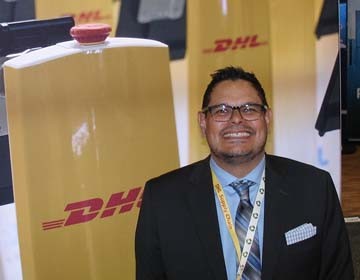RILA event sponsor DHL Supply Chain advancing warehouse robot deployments
Adrian Kumar, DHL Supply Chain’s global head of operations science and analytics, told AJOT that his company anticipates having a total of more than 1,000 robots in place at 11 distribution sites in North America and Europe by the end of 2020. That’s quite an impressive jump since DHL put its first such robotic unit in place four years ago at a medical device company facility in Memphis, Tennessee.
“The retail sector is very bullish on this because they see the potential,” said Kumar, whose company is title sponsor for LINK2020: The Retail Supply Chain Conference at the Gaylord Texan Resort & Convention Center in Grapevine, Texas.
The DHL robots, made by Wilmington, Massachusetts-based Locus Robotics Corp., are now in use at several fashion company facilities, including ones specializing in children’s clothing, outdoor wear and sportswear, as well as distribution centers for specialty wines and liquors, according to Kumar.
“Fashion works well,” he said. “It’s light.”

DHL recently began offering robotic pickers on short-term leases – a development particularly appealing to companies gearing up for peak shipping periods.
“It’s really scalable and flexible,” Kumar said. “It doesn’t require investment in infrastructure changes because it works within existing warehouse infrastructure.”
Not only are DHL Supply Chain customers seeing an average increase in productivity of 70 percent compared with use of traditional manual pick carts, he said, but the typical time for training humans overseeing the units has been reduced to three weeks from 12 weeks.
A warehouse robot can work 16 or more hours a day, but for DHL customers not in position to derive such full benefits of robotics, the company offers other customized solutions, including smart algorithms and augmented reality glasses, Kumar pointed out.
“They are,” he said, “all part of our arsenal.”
Online reporting from the RILA conference continues this week, with comprehensive coverage, including reception photos, slated to appear in print in the March 9 edition of AJOT.
Similar Stories

Alterra IOS acquires massive 15-acre industrial outdoor storage site in Inland Empire
View Article
Realterm expands U.S. portfolio with strategic acquisition of two industrial outdoor storage maintenance facilities in Fremont, California
View ArticleShipsi 3PL solution brings cutting-edge tech to middle and last mile delivery
Shipsi, an industry leader in same-day and instant delivery solutions, today announced further expansions to its 3PL (third-party logistics) solution, solidifying its position as a trusted partner for carriers and…
View ArticleAlliance for Development in Democracy’s consultative dialogue on economic growth partnerships and supply chains
On December 16, in Panama City, Panama, Under Secretary for Economic Growth, Energy, and the Environment Jose W. Fernandez met Ministers of Trade and senior officials from Costa Rica, the…
View Article
Secretary Raimondo applauds release of inaugural White House quadrennial supply chain review
View Article
Telegraph and Lineage announce partnership that seeks to create a more sustainable food supply chain
View ArticleGet the most up-to-date trending news!
SubscribeIndustry updates and weekly newsletter direct to your inbox!





